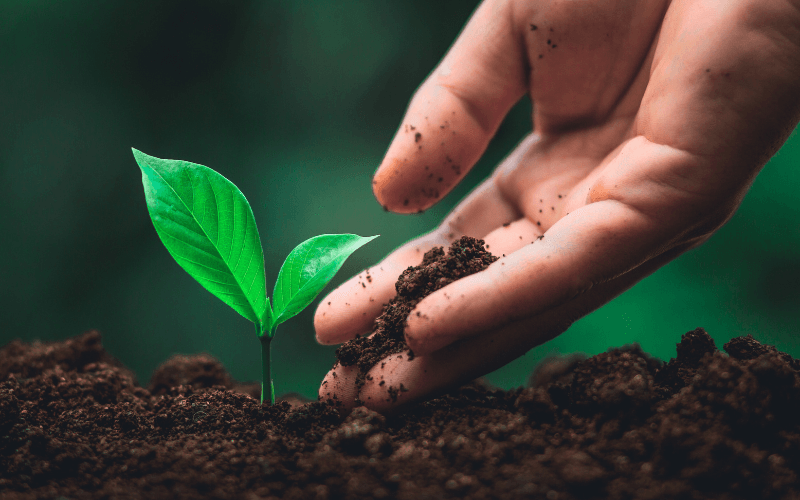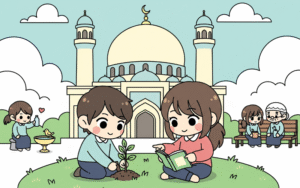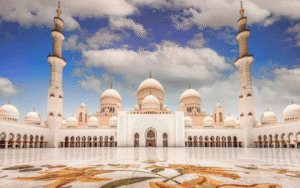Authentic Hadith on The Importance of Planting Trees in Islam

The tree is one of the greatest gifts from Allah the Almighty to the living world. It is the ultimate friend to the environment and all living beings. In fact, the existence of animal life on Earth would be nearly unimaginable without it. Trees provide us with fruit, flowers, and shade. Furthermore, they supply the essential oxygen we need to survive and meticulously maintain our ecosystem’s delicate balance. For this reason, the significance of planting trees in Islam extends beyond a mere worldly task. Indeed, it is considered a profound act of worship (ibadah). It is also given the highest importance as a means of earning perpetual reward, known as ‘Sadaqah Jariyah’ (ongoing charity).
In this article, we will explore in detail the contribution of trees to human life and their immense significance from an Islamic perspective.
Islamic Perspective: Why Planting Trees in Islam is an Act of Worship
The connection between Islam and trees is truly profound. In this faith, the preservation of nature and the environment is considered an integral part of one’s belief (iman). Consequently, the importance of planting trees in Islam is underscored by clear and compelling guidance found in both the Quran and Hadith.
1. Guidance from the Holy Quran
In the Holy Quran, Allah the Almighty frequently mentions plants, trees, and lush green gardens as signs of His creation. Through these signs, He urges humanity to reflect upon the natural world.
Allah says:
فَلْيَنظُرِالْإِنسَانُإِلَىٰطَعَامِهِ﴿٢٤﴾أَنَّاصَبَبْنَاالْمَاءَصَبًّا﴿٢٥﴾ثُمَّشَقَقْنَاالْأَرْضَشَقًّا﴿٢٦﴾فَأَنبَتْنَافِيهَاحَبًّا﴿٢٧﴾وَعِنَبًاوَقَضْبًا﴿٢٨﴾وَزَيْتُونًاوَنَخْلًا﴿٢٩﴾وَحَدَائِقَغُلْبًا﴿٣٠﴾وَفَاكِهَةًوَأَبًّا﴿٣١﴾مَّتَاعًالَّكُمْوَلِأَنْعَامِكُمْ﴿٣٢﴾
“Let people look at their food. It is We Who pour down rain in abundance, then We split the earth, splitting it open, and cause grain to grow in it—and grapes and fresh vegetation, and olive trees and date palms, and dense gardens, and fruit and fodder—as a provision for you and your livestock.”
(Surah Abasa, Verses: 24-32)
These verses clearly affirm that trees and vegetation are a magnificent blessing from Allah, and therefore it is humanity’s responsibility to care for them.
2. A Deeper Look: Hadith About Planting Trees and Their Virtues
The Prophet Muhammad (ﷺ) also deeply emphasized the virtues of planting trees in Islam. He described it as a clear pathway to salvation in the hereafter.
- A Source of Endless Reward (Sadaqah Jariyah): Anas ibn Malik (may Allah be pleased with him) reported that the Messenger of Allah (ﷺ) said: “No Muslim plants a tree or sows a crop, and a bird, a person, or an animal eats from it, but that it is regarded as a charitable gift (sadaqah) for him.” (Sahih al-Bukhari, Hadith: 2320; Muslim, Hadith: 1551) This famous hadith about planting trees clearly illustrates that the reward is continuous. As a result, it benefits the planter long after they are gone.
- A Duty Even at the Final Hour: To emphasize the ultimate urgency, the Messenger of Allah (ﷺ) said: “If the Final Hour is established and one of you has a sapling in his hand, if he can plant it before he stands up, let him do so.” (Musnad Ahmad, Hadith: 12981) This powerful hadith about planting trees underscores an important lesson. Specifically, this act of environmental stewardship is a priority even in the most critical of moments.
- Ownership Through Cultivation: Encouraging the greening of barren lands, the Messenger of Allah (ﷺ) said: “Whoever revives a dead land, it belongs to him.” (Tirmidhi, Hadith: 1378; Abu Daud, Hadith: 3073)
Trees: The Foundation of Human Life and Civilization
Just as a mother’s milk is essential for a baby, trees are for the Earth. Indeed, from food, clothing, and shelter to education, medicine, and the very construction of civilization, the contribution of trees is undeniable.
- Source of Food and Nutrition: Nearly our entire food supply originates from plants and trees. This includes everything from staple grains and vegetables to life-sustaining fruits and oils.
- A Pharmacy of Life-Saving Medicine: A vast majority of ingredients in modern and traditional medical systems are sourced from various medicinal plants. This clearly highlights nature’s vital role in human health.
- The Bedrock of Culture and Society: Trees provide the raw materials for many necessities. For example, they give us clothing (cotton), shelter (wood), and even the paper that enables the spread of education and knowledge.
Planting Trees: Our Best Defense in the Modern Environmental Crisis
Today, the world faces numerous environmental crises. Thankfully, widespread tree planting, or afforestation, is our most effective solution.
- Combating Air Pollution: A single mature tree is a powerhouse. For instance, it absorbs significant amounts of carbon dioxide while releasing the oxygen we need to live.
- Preventing the Greenhouse Effect: Similarly, extensive reforestation is crucial to absorb greenhouse gases. This helps combat global warming and protect vulnerable coastal nations.
- Preventing Soil Erosion and Mitigating Natural Disasters: Furthermore, tree roots anchor the soil. In turn, forests like mangroves act as natural barriers against storms.
- Protection from Lightning Strikes: In addition, tall trees can naturally and effectively ground lightning, which ultimately saves lives.
- Rooftop Gardening and Urban Greening: Finally, bringing green spaces into cities helps reduce temperatures. This is an effective way to combat the urban heat island effect.
The Balance of Islam and Trees: Reverence, Not Worship
While Islam teaches us to care for trees because of their immense benefits, it is also crucial to understand the correct perspective. The relationship between Islam and trees is one of stewardship and appreciation for Allah’s creation, not deification. Therefore, under no circumstances should a tree be considered sacred or worshipped. This is clear Shirk (polytheism). As Allah says:
وَالنَّجْمُوَالشَّجَرُيَسْجُدَانِ
“And the stars and the trees both prostrate (to Allah).”
(Surah Ar-Rahman, Verse: 6).
Our Collective Responsibility: Steps to Promote Afforestation
For the overall welfare of our planet, it is essential to take the following steps to conserve and expand our forests:
- Strictly prohibit illegal logging and deforestation.
- Launch extensive tree-planting campaigns on unused lands.
- Implement a “plant three for every one cut” policy.
- Promote the use of renewable energy sources as an alternative to firewood.
- Make tree-planting initiatives a year-round activity.
- Encourage social forestry programs through educational institutions.
Conclusion
From the perspectives of the Quran, Hadith, modern science, and lived experience, it is clear that planting trees is an indispensable and benevolent act. It not only protects our lives by maintaining environmental balance, but it is also an extraordinary means of attaining salvation in the hereafter. Both our world and our faith underscore a vital truth: planting trees in Islam is a profound responsibility and a path to endless blessings. Therefore, let us each commit to planting at least one fruit-bearing, one timber, and one medicinal tree. By doing so, we can become partners in securing a better future for this world and the next.
Frequently Asked Questions
Why is planting trees important in Islam?
Planting trees is considered a profound act of worship (Ibadah) and a source of continuous reward (Sadaqah Jariyah), as it benefits the environment and all living beings.
How does the Quran view trees and vegetation?
The Quran frequently mentions plants and trees as magnificent signs of Allah's creation (e.g., Surah Abasa), urging humanity to reflect upon them and affirm their responsibility to care for them.
What is Sadaqah Jariyah?
Sadaqah means 'charity' or 'righteousness,' and Jariyah means 'flowing' or 'running.' Therefore, Sadaqah Jariyah is a charitable act whose benefits continue to flow to others over a prolonged period. This distinguishes it from a regular, one-time donation. Learn more









